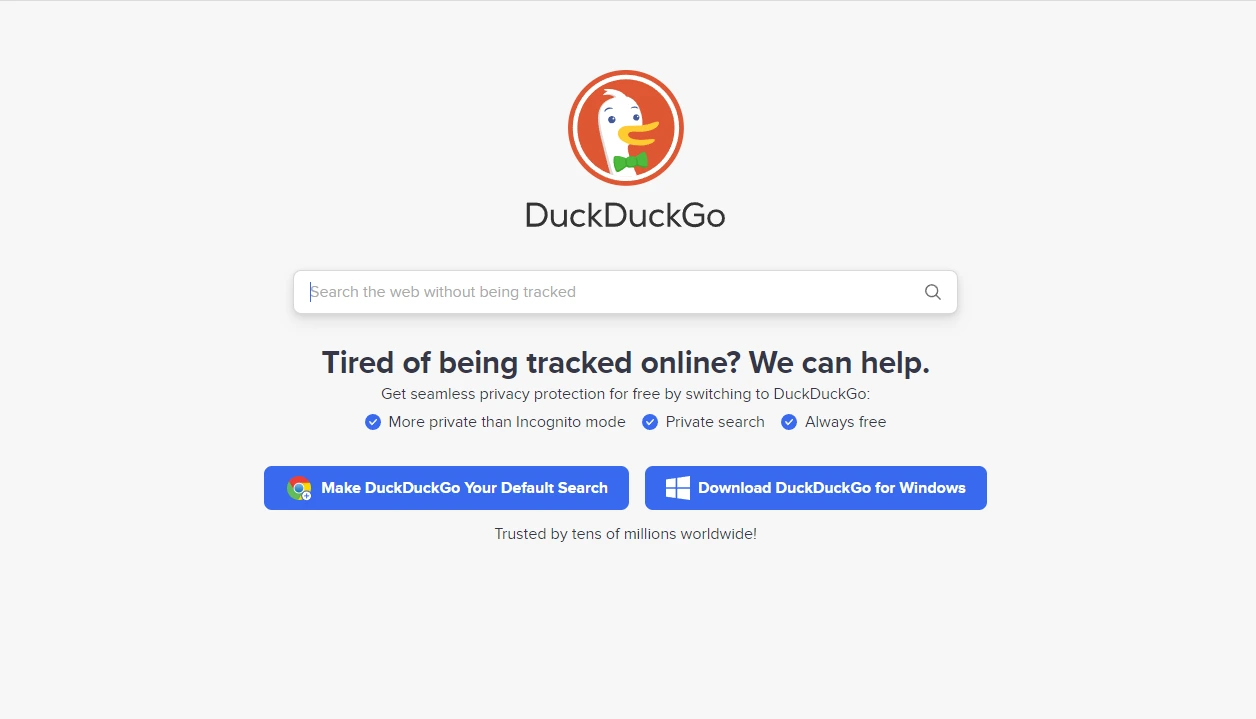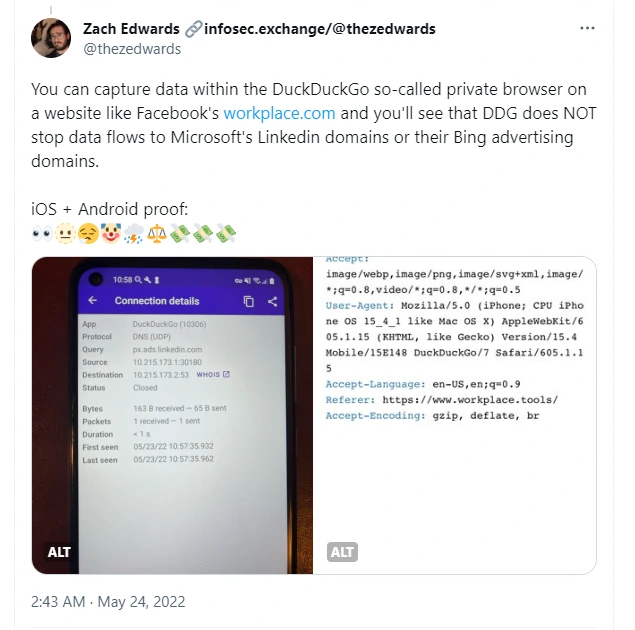There is no denying that Internet privacy is a serious concern nowadays. With the government, companies and hackers all vying to track and collect our personal information without proper consent, one can’t help but wonder if there’s still such a thing as privacy on the Internet. This is where DuckDuckGo comes in, branded as a search engine designed for privacy-conscious users. But, is DuckDuckGo really safe?
In this article, we’ll go over everything you need to know about this privacy-focused search engine, including a bit of history, how it works and its track record so far. Only then can you decide if it’s the right web browser for you.
What is DuckDuckGo?
Before anything else, let’s tackle what exactly DuckDuckGo is. From a glance at their website, we can see that they bill themselves as the answer for people who are tired of getting tracked online by governments, ISPs (Internet Service Providers) and major tech companies like Google, Facebook and Microsoft. What most people don’t know is that DuckDuckGo didn’t start out this way.
Launched in 2008, founder Gabriel Weinberg wanted to create a search engine to rival the likes of Google and Yahoo. Finding that the compsny was unable to compete with these tech giants, the decision was made instead to focus on one aspect that was still quite vague in those early years — Internet privacy. And so, they stopped tracking searches in 2010 and began actively promoting themselves as a privacy-focused browser alternative.
By 2021, DuckDuckGo had expanded its user base to more than 70 million users, so it’s safe to say that their gamble paid off. And while that’s only a fraction of the billions of people that use Google every day, it’s a big enough presence to prove a widespread interest towards Internet privacy.
How does DuckDuckGo work?
As far as search engines go, DuckDuckGo is actually not very different. Users type in a query and the search engine runs it through an algorithm to deliver the most relevant search results. What sets them apart is the company’s approach to handling user data.
Compared to most other search engines, DuckDuckGo doesn’t collect data from users, making it impossible to serve up personalized ads. Other DuckDuckGo benefits also include tracker HTTPS encryption and tracker blocking. This brings up an interesting question — how on Earth do they make any money?
Instead of relying on ad revenue, DuckDuckGo generates revenue through search engine syndication and affiliate marketing. Companies pay them to display a particular search result for any given query to all their users. If a user buys into a product or service through these ads, the engine also gets commissions on those sales. This creative approach allows DuckDuckGo to remain viable without intruding on their user’s privacy.
How safe is DuckDuckGo?
Now that we know how the browser works and generates income, we can ask whether the DuckDuckGo search engine is as safe as they claim. While they certainly have a reputation for making good on their promises of not storing personal information and using trackers, there is recent evidence that this is not always the case.
In a tweet, a privacy researcher named Zach Edwards presented evidence that DuckDuckGo has broken its promise by creating a privacy exception. In layman’s terms, the exception makes it possible for Microsoft to track users who made queries on Bing using the DuckDuckGo browser.
It comes to no surprise that the exception resulted in heavy criticisms from users, but it is worth mentioning that such privacy violations are nothing compared to the daily practices of most other search engines. Google, in particular, is notorious for collecting user information without consent, resulting in hundreds of millions of dollars worth of lawsuits.
If you’ve been keeping tabs on the latest developments in the Internet privacy landscape, you may have heard about the massive $391.5 million privacy settlement that Google paid to 40 states across the US in 2022. This was after an investigation revealed that Google continued collecting users’ location data even with the feature turned off.
Is DuckDuckGo still worth using?
Especially when compared to mainstream search engines, it is fair to say that DuckDuckGo has mostly made good on their promise of privacy. Shortly after the aforementioned tweet, Weinberg came clean about the privacy exception, explaining that it was due to a clause in their syndication agreement with Microsoft from before the company became privacy-focused.
Of course, no search engine is 100% secure—DuckDuckGo’s browser has the same general vulnerabilities as other search engines. This includes the threat of phishing attacks, viruses and malware. For these reasons, we recommend using multiple layers of security in the form of cybersecurity software, VPNs (Virtual Private Networks), etc.
For any user, it’s important to learn about best practices for data security. One good example is to always make sure that your operating system and any software you use is updated regularly. Cybercriminals can sometimes tap into certain unpatched vulnerabilities in these apps to steal sensitive information. This is especially true for the DuckDuckGo browser app which has known extension vulnerabilities.
In any case, the choice of search engine alone will not be enough to create a truly secure browsing experience. If you’re thinking of switching to DuckDuckGo solely due to privacy concerns, then keep in mind that you’ll have to supplement that with other privacy solutions available to you.
The pros and cons of DuckDuckGo
To make it easier for you to identify the strengths and identify solutions to the potential weaknesses of this search engine, we’ve come up with a short list of its pros and cons:
Pros:
- No collection of user data or record of search history
- Offer HTTPS encryption for better data security
- Blocks trackers and ads
Cons:
- Search results are not as comprehensive and accurate as that of Google’s due to lack of personalized data.
- Has some history of allowing third parties to track users on their browser as was in the case of the Microsoft privacy exception.
So, what do you think — is DuckDuckGo worth using? Well, the answer depends on your privacy needs. But objectively speaking, if privacy is your primary concern, then DuckDuckGo remains a viable alternative, despite its shortcomings. But we recommend watching for any change in their policies, especially when it comes to privacy exceptions.
FAQs
Is DuckDuckGo 100% private?
No browser can guarantee complete privacy and DuckDuckGo has its failings, as mentioned above. Still, there’s no doubt it’s a better alternative to other mainstream search engines in terms of privacy.
Why do schools ban DuckDuckGo?
Schools typically forbid the use of DuckDuckGo because students can use it to get around network restrictions and access inappropriate content.
Does DuckDuckGo hide your IP?
No. While the search engine does not collect personal data or track your online activity, it cannot hide your IP address. If you’re interested in that feature, then you can look into using a VPN (Virtual Private Network) for masking your IP address.
How many people are using DuckDuckGo?
According to a June 2021 report by Startup Bonsai (a business resource site), DuckDuckGo has an estimated user base of 70-100 million users.
